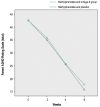Effect of omega-3 plus methylphenidate as an alternative therapy to reduce attention deficit-hyperactivity disorder in children
- PMID: 31122010
- PMCID: PMC6753311
- DOI: 10.3345/kjp.2018.06982
Effect of omega-3 plus methylphenidate as an alternative therapy to reduce attention deficit-hyperactivity disorder in children
Abstract
Background: Attention deficit-hyperactivity disorder (ADHD) is one of the most common chronic behavioral disorders in school-aged children.
Purpose: This study aimed to evaluate the effect of omega-3 supplementation as an alternative therapy for ADHD, which can be caused by vitamin and mineral deficiencies.
Methods: This was a double-blinded clinical trial study. Sixty-six children with ADHD (aged 6-12 years) referred to our child and adolescent psychiatric educational and therapeutic clinic were selected based on Diagnostic and Statistical Manual of Mental Disorders, Fourth Edition, Text Revision criteria. Instruments including the Parent ADHD Rating Scale were used to assess ADHD at 0, 2, 4, and 8 weeks during the study.
Results: The results showed no statistically significant difference between the methylphenidate with omega-3 group and methylphenidate with placebo group based on the Parents ADHD Rating Scale between week 0 (P≥0.96) and week 8 (P≥0.75). There were no significant intergroup differences between the Inattention (P≥0.48) and hyperactivity/impulsivity (P≥0.80) subscale scores on the Parents ADHD Rating Scale. The most common drug complications in the methylphenidate with placebo and methylphenidate with omega-3 groups were anorexia (27 [54%] vs. 41 [60.29%], respectively) and diarrhea (10 [20%] vs. 8 [11.76%], respectively), but the differences were not statistically significant (P> 0.05).
Conclusion: Our results demonstrate that a specific dose of omega-3 for 8 weeks had no effect on ADHD.
Keywords: Attention deficit-hyperactivity disorder; Child; Omega-3 supplement.
Conflict of interest statement
No potential conflict of interest relevant to this article was reported.
Figures
References
-
- Antai-Otong D, Zimmerman ML. Treatment approaches to attention deficit hyperactivity disorder. Nurs Clin North Am. 2016;51:199–211. - PubMed
-
- Connor DF. Preschool attention deficit hyperactivity disorder: a review of prevalence, diagnosis, neurobiology, and stimulant treatment. J Dev Behav Pediatr. 2002;23(1 uppl):S1–9. - PubMed
-
- Rowland AS, Lesesne CA, Abramowitz AJ. The epidemiology of attention-deficit/hyperactivity disorder (ADHD): a public health view. Ment Retard Dev Disabil Res Rev. 2002;8:162–70. - PubMed
-
- Mick E, Biederman J, Prince J, Fischer MJ, Faraone SV. Impact of low birth weight on attention-deficit hyperactivity disorder. J Dev Behav Pediatr. 2002;23:16–22. - PubMed
-
- Mick E, Biederman J, Faraone SV, Sayer J, Kleinman S. Case-control study of attention-deficit hyperactivity disorder and maternal smoking, alcohol use, and drug use during pregnancy. J Am Acad Child Adolesc Psychiatry. 2002;41:378–85. - PubMed
LinkOut - more resources
Full Text Sources



